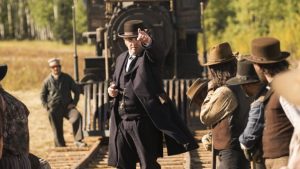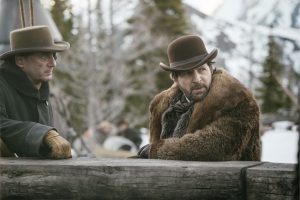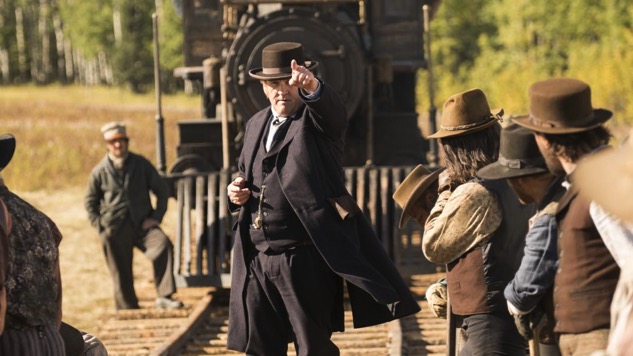by Bryan Caswell and Heather Clancy
In the summer of 2016, one of my personal institutions came to a close. AMC’s gritty, historically-grounded series Hell on Wheels wrapped up its final season and sailed off into the sunset. Hell on Wheels is one of my all-time favorites, and with the intent of reviewing it on Concerning History (and introducing Heather to it), we have recently been watching the entire series. In order to give due justice to this loaded show, Heather and I will be breaking it down into three separate reviews. What follows is the third, covering its final season.

The final season of Hell on Wheels is radically different than all that came before. In search of his missing Mormon wife and child, Bohannon quits the Union Pacific and ends up the chief engineer of Collis Huntington’s Central Pacific, blasting his way through the Sierras in the race to beat Cullen’s previous employer. As the closing episodes race through the conclusion of the Bohannon-Swede grudge match and the completion of the railroad in Utah, viewers might be a bit disappointed by the varying quality in episodes and the abrupt way some storylines conclude (especially the dangling threads of the revenge plot that began the entire show, now completely forgotten and never addressed). Nevertheless, the decision to switch focus to the Central Pacific comes with exciting new historical ground to cover.
While Hell on Wheels had so far admirably covered the complexities of the black, Irish, and German experience building the transcontinental railroad, one group had been entirely absent, due to their employment by the Central Pacific rather than the Union Pacific: the Chinese. Now with Bohannon working for Huntington out of the town of Truckee and in the tunnels through the Sierras, the Chinese experience takes center stage. This experience is admirably grounded in historical context as well, with the shadow of the brutal Taiping Rebellion hanging over Season 5 like that of the Civil War in Season 1 & 2. Perhaps most intriguing is the story of Bohannon’s new antagonist, the villainous Chang. A former Taiping officer, Chang runs the labor market, brothel, and opium den in the CP’s base of operations in Truckee, and while his actions are despicable throughout the season, his core motivation of earning respect as an equal of his white business partners gives him a certain sympathetic twist.

Not everything is historically rosy in Season 5, however. It is fitting that, in a show that began with the scars of the American Civil War, we should get a flashback to that conflict in its final season. This one comes as background for the Swede’s experiences in Andersonville, and unfortunately it is an historical mess. As you might expect, the show steers into the popular memory of Andersonville as some sort of literal hellscape. Attempted cannibalism, shown explicitly in this flashback, has no confirmation in any sources, and while it isn’t out of the realm of possibility, uninformed viewers may indelibly associate it with Andersonville after viewing the episode. Similarly, soldiers’ journals repeatedly mention that the key to survival was keeping good care of your shelter and belongings, so the entire camp’s rotting appearance would not have been quite the case. Even the appearance of a lone guard within the stockade to taunt the Swede is odd; both for personal safety from prisoners and an aversion to the unhygienic miasma of the enclosure, such a situation would have been extremely unlikely. Credit is due, however, for not bringing Camp Commandant Henry Wirz into the picture as the devil himself.

Hell on Wheels end, when it comes, may feel somewhat abrupt, but the road had to be finished at some point. Grant’s offer of a colonelship to Bohannon in the US Cavalry gets us a brief glimpse of this grizzled greyback in Union blue, and Durant gets to close out the show with another wonderfully tycoon-esque monologue. Without giving away any spoilers, Cullen’s final choice and direction as the credits roll offer hope, however slim, of a sequel series (or at least some fanfiction) even more in line with the interests of this student of nineteenth-century imperialism. We can’t recommend this show highly enough, and maybe, like us, you too will find yourself missing that signature Cullen Bohannon growl by the time the final episode ends.
